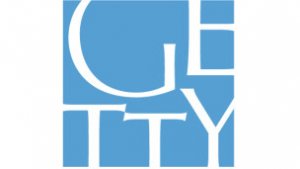Getty Scholar Grants
Annual Theme: Provenance

The Getty Scholars Program supports innovative research about art, conceived in the broadest terms, and its histories, by providing a locus for international scholars to forge collaborations across disciplines and professional practices, while also developing new audiences for their work. During their residency, the scholar cohort is immersed in a vibrant local community devoted to the advancement of knowledge and hosted at an institution committed to preserving, understanding, interpreting, and sharing its vast library and collections. Scholars may be in residence at the Getty Center or Getty Villa.
Background
History
Since 1985, the Getty Scholars Program has hosted around 1,300 residential scholars from over fifty countries to conduct research on topics related to the annual theme while residing in Los Angeles. Selected projects have spanned geographical regions and time periods, from ancient to contemporary eras. Getty receives between 300 and 400 applications each year and awards fellowships to about twenty applicants annually.
Structure
A mix of senior scholars and junior fellows are selected for the Scholars Program cohort. The cohort's research projects are focused on an annual theme. The three main grant categories are:
Within the annual theme, Getty offers dedicated appointments through its African American Art History Initiative (AAAHI) for scholars who are expanding critical inquiry of African American art and its frameworks. See the sections below for more information about applying. Interested applicants should apply to the appropriate category above based on their degree status and in the application, check the box for “African American Art History Initiative.”
The Getty Scholars Program is committed to fostering collaborative research and invites expressions of interest from teams, although each team member must meet eligibility requirements and submit an application individually.
As a related offering at Getty, the Conservation Guest Scholars Program provides opportunities for established scholars and professionals who have attained distinction in the cultural heritage conservation field. Additionally, under the Classical World in Context Initiative, the Getty Scholars Program at the Villa contributes to the understanding and preservation of cultural heritage through advanced research on the arts and cultures of antiquity. Scholars affiliated with all of these programs live in the same complex and participate in many shared activities and lectures while in residence. The three parallel programs provide ample opportunities for exchange and collaboration. Applications for the Conservation and Villa programs are made separately.
This page provides information about Scholar Grants for established researchers and professionals residing at the Getty Center.
- Scholar Grants for established researchers and professionals who have held PhDs for at least 5 years and/or possess strong records of publication and professional activity, at the Getty Center or Getty Villa
- Postdoctoral Fellowships for recently granted PhDs at the Getty Center or Getty Villa
- Predoctoral Fellowships for PhD candidates at the Getty Center
Applicants for 2026–2027
Application Timeline
Applications for 2026–2027 year grants will open on July 1, 2025. The deadline to apply is October 1, 2025.
Annual Theme: Provenance
In recent years the study of provenance has expanded in urgency and scope, in line with the art historical turn toward the lives of objects, and also in response to evolving debates regarding the ownership of art. Relevant to all periods and areas of art production, provenance research brings to light fundamental questions about who may lay claim to art and how objects transform as they change hands, collections, and exhibition venues. Increasingly available information on broken chains of ownership caused by theft, illicit trade, and historical looting have fueled restitution debates and ignited questions about the ethics of collecting in climates of conflict or asymmetries of power. Digitization and databases have also opened up the interdisciplinary possibilities of provenance research and laid the ground for art restitution efforts and other forms of reparation.
For the 2026–2027 year, the Getty Scholars Program invites innovative proposals for projects that explore provenance and adjacent research areas, including but not limited to the history of collecting, the study of the art market, and broader explorations around the ownership of art objects. The scholar cohort will be invited to examine and critique the arena of provenance studies while also envisioning its future, situated between the practices and demands of source communities, art historians, museums, and the market. Applicants are invited to propose projects, either individual or collaborative, that reflect upon the ownership, transfer, and movement of art objects from all world regions and time periods.
For this year, the Getty Scholars Program aims to link scholars with Getty resources and researchers and foster a lively community around the study of provenance—an increasingly significant domain of art historical and curatorial practice that centers the histories of both objects and people. While in residence, scholars will have the opportunity to delve into the Getty Research Institute’s vast collections of rare materials that support provenance research and explore the newly remodeled Getty Provenance Index, which lays the ground for cutting-edge computational approaches to the field.
African American Art History Initiative Grants
Under the umbrella of the annual theme, dedicated grants are available via the African American Art History Initiative (AAAHI). This residential program, which welcomed its first cohort of scholars in fall 2021, provides financial support and housing to scholars who are expanding critical inquiry of African American art and its frameworks. AAAHI invites scholars working on topics that align with the annual theme. As part of the scholar year cohort, AAAHI scholars have opportunities to present their research and receive feedback from an interdisciplinary group of peers. AAAHI scholars can also expect additional programming with Getty staff supporting the study of African American art.
We invite applications from scholars who focus on African American art and visual culture in all time periods and media and in a broad range of theoretical and methodological traditions. Projects that propose engagement with Getty’s growing collections of archival and primary source material related to African American art history are welcome. However, relevance to Getty holdings is not a project requirement. Applicants should indicate in their project proposal how their project would align with AAAHI's aim to make African American art history more visible to the public and accessible to the scholarly community worldwide.
Grant Details
The information on this page pertains to Scholar Grants for established researchers and professionals at the Getty Center. Visit the Pre- and Postdoctoral Fellowships or the Getty Scholars Program at the Villa pages for details about those specific programs.
Eligibility
Scholar Grant applicants should have received a PhD before September 1, 2022. Applicants from associated fields who do not hold a PhD but have commensurate professional experience will also be considered.
Applicants who received their doctoral degree after September 1, 2022 should apply for a Postdoctoral Fellowship.
After a waiting period of 6 years, previous Getty Residential Grant recipients in any category are eligible to reapply for another grant in whichever category they are eligible for and interested in. See FAQs for more information.
Terms
Scholar Grant recipients at the Getty Center may be in residence from three to nine months and receive varying stipends as detailed below:
The grant also includes a workstation at the Getty Research Institute or Getty Villa, research assistance, a travel stipend, an apartment in the Getty scholar housing complex, and an available healthcare option. These terms apply as of July 2024 and are subject to future changes.
See the overview of the Getty Residential Scholar and Fellow Program for further details about stipends, housing, healthcare, and more.
- Three-month residency: September–December/January–March; $21,500 stipend
- Six-month residency: September–March/January–June; $43,000 stipend
- Nine-month residency: September–June; $65,000 stipend
Application Process
Grant Portal
Applications are submitted through the Getty Foundation Grant Portal. You will need to create or update your account and password, log in, and begin a new application. We strongly recommend using Google Chrome, though you may also use Firefox or Safari. The Internet Explorer (IE) browser is not compatible with our portal.
You may return to your work at any time by visiting the portal at the link above and logging into your account.
Note: Once you have created and saved an application form, you may return to work on the same form by selecting the "Applications: In Progress" link. Otherwise, you may inadvertently create multiple versions of the same application.
Project Proposal
The project proposal should not exceed 5 pages typed and double-spaced. The proposal should include:
- Project description
- How the project addresses the annual theme
- How the project meaningfully contributes to the applicant’s field of scholarship
- Proposed plan for study and research
- Benefits to the project from the resources at the Getty (if applicable)
- For AAAHI Grants: also include how the project will generate new knowledge in the field of African American art history
Curriculum Vitae
The curriculum vitae (CV) is a record of all your professional activities.
Optional Writing Sample
Applicants are welcome to submit a single writing sample in support of their proposal. It should not exceed 20 double-spaced pages in length.
Review Process
Evaluation Criteria
Getty Scholar Grants are awarded on a competitive basis. Applications as a whole are evaluated based on the following criteria:
Letters of reference are not required for the Scholar Grant application.
- Overall quality of the application, including its adherence to the annual theme
- How the project would contribute to the advancement of the applicant’s field of scholarship
- Applicant's past achievements
- Applicant's qualifications to undertake the project
Decision Notification
Applicants will be notified of their application outcome approximately 6 months after the deadline.
Frequently Asked Questions
Find answers to the most common questions about residential grant opportunities at Getty.
Still have questions? Send inquires to researchgrants@getty.edu.
